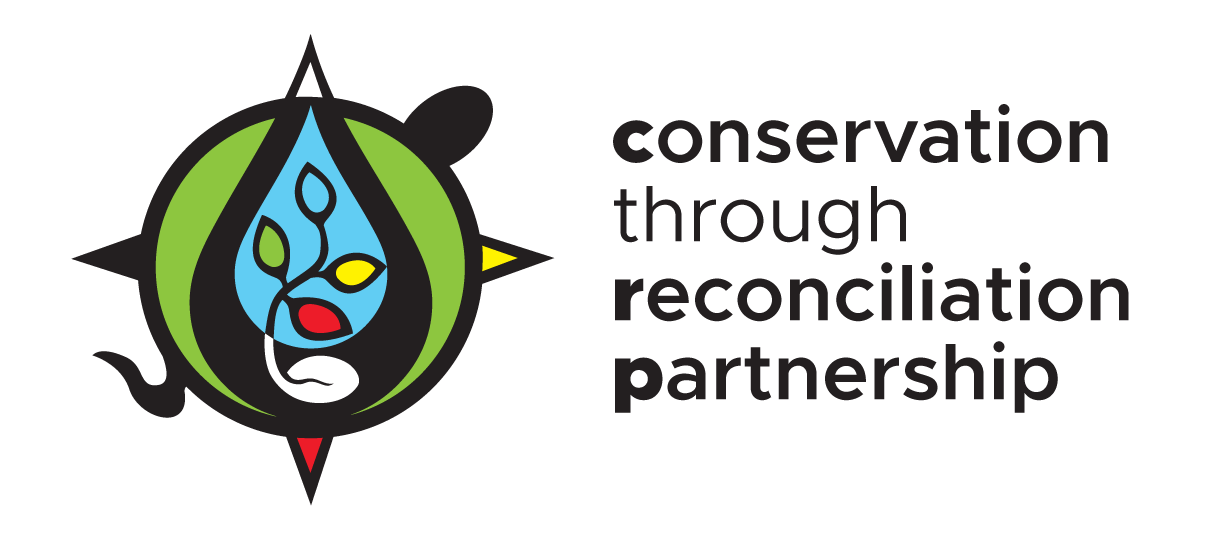Summer 2022 Edition
Our Seasonal Partner Update helps to ensure we’re rising together in the spirit of respect, mutual responsibility, and reciprocity. For Conservation through Reconciliation Partnership members only, these internal newsletters include:
· Ongoing and upcoming projects at various phases from Co-Learning Circles and Work Streams
· Upcoming communications and knowledge-sharing activities and opportunities to spread the word
· Opportunities for collaboration
· Information on how members of the CRP family can actively contribute to our collective work.
These internal updates will complement our seasonal public-facing newsletters which focus on sharing the story of work that has been recently completed. To sign up for the public-facing newsletter, click on the button below:
Announcements
Summer Break
The Conservation through Reconciliation Partnership will be slowing down over the summer months of July and August. Most streams and collaborative sharing circle meetings will be on pause during this time. We look forward to gathering and seeing you again in September!
OFFICIAL LAUNCH OF THE IPCA KNOWLEDGE BASKET
On June 20th, we gathered virtually to celebrate the collective efforts of Indigenous leaders, organizations, and communities in addressing biodiversity loss and climate change, while healing relationships with the lands, waters, and between humans and our non-human relatives, for the benefit of all. Watch the full recording of the event here: https://youtu.be/zrakR3aJCII
In collaboration with the Narwhal, the Indigenous Leadership Initiative, and the IISAAK OLAM Foundation, we hosted a panel discussion to reflect on the wisdom and vision brought forward by Indigenous leaders from generations past; examine current opportunities and challenges for Indigenous conservation leadership; and explore a future where conservation is Indigenous-led.
As part of this celebration, we officially launched the IPCA Knowledge Basket – a dynamic, digital space that holds and shares resources to inform and support Indigenous-led conservation initiatives, including Indigenous Protected and Conserved Areas (IPCAs). A legacy initiative of the Conservation through Reconciliation Partnership, the IPCA Knowledge Basket was created to honour, celebrate, and catalyze Indigenous-led conservation for the health and vitality of future generations.
The IPCA Knowledge Basket would not have been possible without the generous contributions of many. The development team included Monica Shore, Allison Bishop, Stephanie Siddon, Soudeh Jamshidian, Jena-Lee Ashley, and Kristy Tomkinson.
The CRP Leadership Circle, which includes Marilyn Baptiste, Eli Enns, Faisal Moola, Steven Nitah, Robin Roth, and Lisa Young, provided the strategic oversight for the project. We are grateful for the leadership of Elders Albert Marshall, Larry McDermott, Marilyn Capreol, and Paulette Fox. Thank you for sharing your wisdom and guiding our Etuaptmumk/Two-Eyed Seeing process.
We’d like to express our deepest gratitude to Beverly Jeddore (Eskasoni First Nation) who contributed songs from the eastern gate and Gordon Planes (T’Souke Nation) who contributed a song from the western gate.
Many thanks to all the Indigenous language speakers who contributed the initial greeting and thank you messages to the website.
Our thanks to the University of Guelph, the Social Sciences and Humanities Research Council, David Suzuki Foundation, Ducks Unlimited Canada, and the World Wildlife Fund Canada for providing financial support for this platform.
Read the press release here: https://conservation-reconciliation.ca/crp-blog/press-release-ipca-knowledge-basket-launch
Explore the IPCA Knowledge Basket here: www.ipcaknowledgebasket.ca
We encourage you to share this resource with your networks!
We value your feedback! Please send any questions, concerns, or suggestions for the IPCA Knowledge Basket to info@ipcaknowledgebasket.ca
CRP MIDTERM EVALUATION/STORYTELLING PROCESS
Over the past several weeks, we hosted several mid-term evaluation/storytelling sessions. Now that we are in the fourth year and mid-point of our partnership, we will be engaging in a process of reflection and renewal. The goals of the evaluation/storytelling session were to:
Help us understand the experiences of partnership members to date;
Identify our impact; and
Determine where we should focus our energies in our remaining years to ensure continuing support for Indigenous-led conservation.
These sessions have now wrapped up and we thank you all for your thoughtful reflections and feedback. We’ve collected the anonymous feedback to inform the CRP Leadership Retreat that was originally scheduled to take place in late July. The retreat is an opportunity for the Leadership Circle, Elders Lodge, and Stream Leads to gather and co-create a strategy for the second half of our partnership with a clear vision for establishing a legacy that will support IPCAs moving forward. The retreat has been postponed to late summer/early fall. We will share a fulsome report with the partnership following that retreat.
New and Ongoing Projects
INDIGENOUS LAND TRUST CIRCLE
Osgoode Hall Law School Student Project
This academic year a small group of Osgoode Hall Law Students enrolled in the Environmental Justice and Sustainability (EJS) Clinic were privileged to work with the CRP and the Indigenous Land Trust Circle. From September to April, the students researched key areas of law and policy that are relevant to communities who are interested in Indigenous Land Trusts as a tool to implement Indigenous jurisdiction and uphold relationships and responsibilities to their territories.
For example, Matthew Green explored how land trusts can use conservation easements in different jurisdictions across Canada, pointing out the opportunities and challenges of these types of instruments as they intersect with Indigenous legal and governance systems.
Matthew Apostolides provided an overview of key tax frameworks relevant to land trusts and how these intersect with taxation regimes relevant to Indigenous communities and governments.
Yalda Mousavi's research connected Indigenous land trusts to the broader Land Back movement and explored the importance of ensuring these are Indigenous-led initiatives expressly furthering self-determination.
Dylan Gold examined the complexities of charitable status and questions that are particularly relevant to Indigenous organizations when incorporating and considering becoming a charity. He also explored the use of endowments as a tool for long-term sustainability under the guidance of Clint Jacobs of the Walpole Island Land Trust.
The students had the opportunity to interview several key experts working with Indigenous land trusts across Canada. These insights have informed the research and will shape future work. Over the summer Professor Estair Van Wagner and the EJS Clinic will work with the Dr. Leora Gansworth and the IPCA Co-Learning Circle to develop the research into accessible tools for communities interested in exploring the use of land trusts in their territories.
Indigenous-led Land Trusts Project
This project forms connections among the many networks of Indigenous communities and territories where the land trust model is being utilized or adapted. For Dr. Leora Gansworth, it is an honor to witness the advancement of Indigenous-led conservation and invigorating relationships: among people, and with land, water, and other relatives.
Over the next few months, stay tuned for more opportunities to engage with the Land Trust Project. Indigenous-led land trusts rely on dedication, communication, and the sharing of knowledge and resources. Collaborators on this project are planning a webinar event for the fall and will offer summer reading blog posts leading up to the event in July and August.
There are web-based tools currently in development, including a toolkit and other resources for communities. The project team also welcomes communications from people with experience in Indigenous-led land trusts.
Meegwech/thank you to all those who have participated thus far. We recognize there are land trust innovations outside of and beyond this network, and we welcome more knowledge and collaboration.
For now, stay tuned for the blog posts coming in July and August.
If you are interested in participating in the research, please contact Dr. Leora Gansworth lganswor@uoguelph.ca.
Work Stream Projects
Domestic Law and Policy Stream
Legal Scan
The Domestic Law and Policy Stream brought together Indigenous and non-Indigenous legal scholars, students, and practitioners to create a scan of Crown legislation and regulatory mechanisms that may be leveraged to advance Indigenous Protected and Conserved Areas across federal, territorial, and provincial jurisdictions.
This project was led by Victoria Kacer with guidance from Larry Innes and contributions from the stream members. It was developed in response to questions the CRP has received from IPCA practitioners regarding pathways for IPCA creation.
This work will complement an earlier report produced by Larry Innes (OKT Law) and Georgia Lloyd-Smith (West Coast Environmental Law) which explored Indigenous laws in the context of conservation.
A draft has been completed and is under review for accessibility. It will be publicly available in the Fall of 2022 but can be shared with Indigenous governments and partners upon request. This work will be complemented by the Reconciling Indigenous Laws and Protected Areas Legislation project described below.
Reconciling Indigenous laws and protected areas legislation
Anne Bell (Ontario Nature) and Rachel Plotkin (David Suzuki Foundation) are pleased to announce a collaborative project aiming to set the table for the transformation of provincial protected areas legislation in a manner that reflects and upholds Indigenous laws.
The project partners, including David Suzuki Foundation, Ontario Nature, Plenty Canada, CRP, WWF-Canada, University of Guelph, will convene and consult with Indigenous and non-Indigenous experts in law and Indigenous-led conservation, including members of the Domestic Law and Policy Stream, to develop a framework for legal reform, including guiding principles and options for workable draft provisions.
The project will highlight and address the issues, questions, challenges and opportunities arising from efforts to reconcile Indigenous and Crown constitutional and legal orders, as urged by Canada’s Truth and Reconciliation Commission. The output will serve as a template for jurisdictions across Canada. The proposed project stands to make a significant contribution to areas of legal reform at the intersection of conservation and reconciliation.
For more information, please contact Rachel Plotkin at the David Suzuki Foundation (rplotkin@davidsuzuki.org).
Indigenous Rights and Carbon Project
Indigenous-led conservation areas require a sustainable long term economic heart. One approach could come through natural climate solutions (NCS) – activities that protect, restore and manage lands to maximize carbon sequestration and storage. Indigenous Peoples have been managing their lands and waters for thousands of years, and they have a wealth of knowledge to continue to steward these lands in healthy and resilient ways. However, there are legal and regulatory challenges to be overcome in actualizing Indigenous-led NCS.
Clearly defined rights to manage the carbon in lands is a necessary precursor to creating Indigenous-led NCS as part of thriving conservation economies in Canada. Led by Steven Nitah, Mary-Kate Craig and Kevin Smith, the IPCA Economics, Infrastructure and Finance Stream will convene conversations and gatherings to determine action steps to achieving carbon rights.
Want to be involved? Interested in learning more? Reach out to Mary-Kate at kathrine@uoguelph.ca
IPCA Economics, Infrastructure, and Finance Stream (7th Stream)
Indigenous Infrastructure Research and Education Hub at the University of Victoria
The 7th Stream hosted an AEC Industry KAIROS Blanket Exercise night at the Songhees Wellness Centre to build the foundations for industry partners to develop infrastructure with Indigenous Nations in Ethical Space.
The team also had a meeting with the Dean of Engineering at the University of Victoria (UVic) and several individuals from Civil and mechanical engineering about establishing an Indigenous Infrastructure Research and Education Hub at UVic.
Collaboration with the Reconciliation Through Engineering Project at the University of Toronto.
This research will contribute to best practices for participatory research with Indigenous communities on matters related to the sustainable development of the Blue Economy in Canada. The work will include a literature review, interviews, and focus groups to develop a set of best practices and a framework. The intention is to structure this work with a particular focus on marine infrastructure, energy, and water resources. Individual initiatives currently being addressed in the Blue Economy Program can be used as case studies in the interaction.
Training for Water Quality Testing in Tsawout First Nation
The 7th Stream supported the development of training in Tsawout First Nation on water quality testing. Two workshops were held, one for adults and one for youth. This work will support the development of Natural infrastructure to promote biodiversity in intertidal zones and research relationships between the nation and University of Victoria. A full report on the Tsawout Nation Water Contamination Workshop – Discussion Summary & Test Results is available upon request, email crpinfo@uoguelph.ca for more information.


